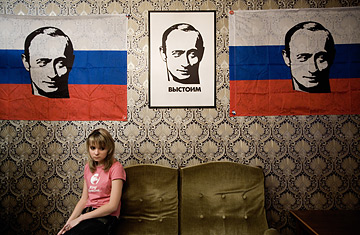
A female member of VV fan club of the Russian president, Vladimir Vladimirovich Putin, sits in a room in Moscow.
(3 of 6)
Their faith suffered terribly at the hands of the Soviets. The Boris and Gleb monastery endured a typical fate: Stalin had all the monks and priests killed and turned the monastery into a prison for the next 50 years. There's joy and relief at the return of Russia's religion, and expressions of faith — some extreme, others odd, but all exuberant — have become commonplace. I met a monk on the side of the M10 highway who had been wandering possessionless for nine years, a vow of poverty so extreme that church elders had finally ordered him to return to his monastery. Another day we happened on a baptism — of a car. Father Aleksandr stood by his church in Rashkino, wafting incense into a young couple's car, then flicking holy water onto the engine block. When we stopped, he did the same for our Lada Sputnik hatchback. Remembering the fatal mangle of a motorcycle accident we had passed earlier that day — Russia's roads are among the world's deadliest — I was glad for the blessing.
The Orthodox revival has heavy political implications. Of all the factors that led to the downfall of the Soviet Union, few were more important than the 1988 celebrations marking the 1,000-year anniversary of the Christian conversion of Russia. Millions joined in the celebration, a spontaneous mobilization that seemed to remind the Russians that they were a Christian people. Three years later, the Soviet Union was gone.
But if the Eastern Orthodox Church was revolutionary in 1988, it is reactionary now. Flush with Kremlin support, the church and its adherents are trying hard to re-establish its old spiritual hegemony in the country. In Novgorod province, I met a young college lecturer named Aleksandr Chausov, who teaches a class called "The Basics of Religious Safety." In classroom lessons and in lectures he gives as a leader of Rage, an advocacy group he co-founded, Chausov warns about the dangers of what Russians call sects — the minor faiths that have gained influence since the fall of the Soviet Union. Somewhat dangerous are "classic sects," he said, like Evangelicals and Southern Baptists, which he said are fine in the U.S. but don't belong in Russia. Worse are "totalitarian sects," defined as new religions that fleece the faithful. He said this includes Scientologists, Hare Krishnas and Mormons. As a patriot and devout Eastern Orthodox Christian, he said, he feels it's his job to sound the alarm. "The totalitarian sects are a threat to the Russian state," he said. "They prey on our people, who have no cultural background for other religions, and brainwash them."